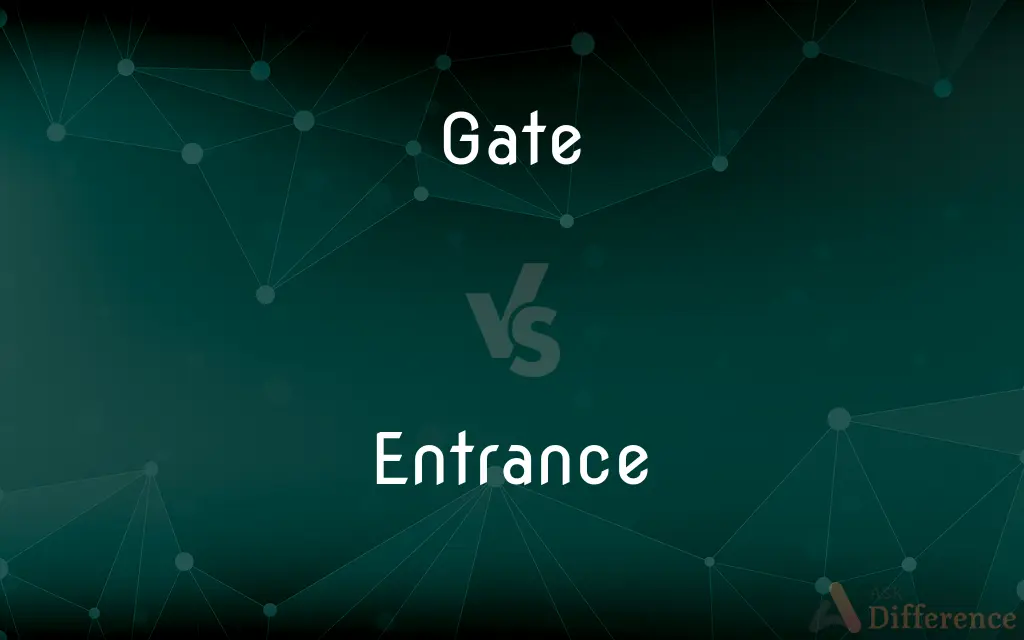Gate vs. Entrance — What's the Difference?
Edited by Tayyaba Rehman — By Urooj Arif — Updated on April 6, 2024
A gate is a movable barrier used to close off an entryway, often found in fences or walls, while an entrance is any access point or opening used for entering a place.

Difference Between Gate and Entrance
Table of Contents
ADVERTISEMENT
Key Differences
Gates serve as a specific type of entrance designed to be opened or closed to control access. They are typically part of a larger barrier, such as a fence or wall, and can be made from various materials like wood, metal, or plastic. On the other hand, an entrance refers more broadly to any opening or area that allows entry into a building, room, or enclosed space. Entrances can range from simple doorways to grand vestibules, depending on the structure's design and purpose.
While gates often imply a level of security or selective access, providing a physical means to regulate who or what enters a space, entrances may or may not incorporate such security features. For instance, the main entrance of a public building may be open to everyone during certain hours, whereas a gate might require a key, code, or permission to pass through.
The design and aesthetic of gates can vary widely, often reflecting the character of the property they protect. They can be ornate and decorative, serving as a visual statement, or purely functional and utilitarian. Entrances, in contrast, play a significant role in the architectural appeal and accessibility of buildings. They are designed not only for function but also to welcome visitors and provide a first impression of the space beyond.
In terms of functionality, gates are primarily concerned with the passage of people, vehicles, or animals in and out of an enclosed area, focusing on control and security. Entrances, however, are integral to the flow of traffic within and into buildings or spaces, addressing broader considerations like ease of access, safety, and compliance with regulations such as those for accessibility.
Understanding the distinction between gates and entrances is important in planning and design, as each serves different purposes and conveys different meanings within the context of architecture and property layout. While a gate emphasizes boundary and control, an entrance highlights transition and welcome, illustrating the diverse ways in which people and spaces connect.
ADVERTISEMENT
Comparison Chart
Definition
A movable barrier within a wall or fence for controlling access.
Any opening or area that allows entry into a place.
Primary Function
To control access and provide security.
To provide access into buildings or enclosed spaces.
Location
Often found in fences, walls, or enclosures.
Located at the entry points of buildings, rooms, or properties.
Materials
Commonly made of wood, metal, or plastic.
Varies widely, including doors, archways, or open passages.
Security
Usually implies a level of security or selective access.
May or may not have security features; broader in function.
Compare with Definitions
Gate
Operated manually or automatically.
The luxury home featured an automatic gate for convenient entry and exit.
Entrance
An architectural feature designed to impress.
The museum's entrance was designed by a renowned architect.
Gate
Used in gardens to separate different areas.
A small wooden gate leads into the vegetable garden.
Entrance
The main access point into a building.
The hotel's grand entrance was adorned with flowers and lights for the event.
Gate
Utilized in software for feature access control.
The application uses feature gates to roll out updates gradually.
Entrance
A doorway or opening in a structure.
The side entrance is used for deliveries and service personnel.
Gate
Found in airports to manage boarding.
Flight 202 now boarding at Gate 15.
Entrance
Can signify the beginning of an event or experience.
Her dramatic entrance at the party caught everyone's attention.
Gate
A barrier that can be opened or closed to control access.
The wrought iron gate at the driveway entrance added to the estate's grandeur.
Entrance
Used metaphorically to describe starting points.
His entrance into the field of science was marked by groundbreaking research.
Gate
A gate or gateway is a point of entry to or from a space enclosed by walls. The word derived from old Norse "gat" meaning road or path; But other terms includ yett and port.
Entrance
The act or an instance of entering.
Gate
A structure that can be swung, drawn, or lowered to block an entrance or a passageway.
Entrance
A means or point by which to enter.
Gate
An opening in a wall or fence for entrance or exit.
Entrance
Permission or power to enter; admission
Gained entrance to medical school.
Gate
The structure surrounding such an opening, such as the monumental or fortified entrance to a palace or walled city.
Entrance
The point, as in a musical score, at which a performer begins.
Gate
A doorway or walkway in a terminal, as at an airport, through which passengers proceed when embarking or disembarking.
Entrance
The first entry of an actor into a scene.
Gate
A waiting area inside a terminal, abutting such a doorway or walkway.
Entrance
(Nautical) The immersed part of a ship's hull forward of the middle body.
Gate
A means of access
The gate to riches.
Entrance
To put into a trance.
Gate
A mountain pass.
Entrance
To fill with delight, wonder, or enchantment
A child who was entranced by a fairy tale.
Gate
The total paid attendance or admission receipts at a public event
A good gate at the football game.
Entrance
(countable) The action of entering, or going in.
Her entrance attracted no attention whatsoever.
Gate
A device for controlling the passage of water or gas through a dam or conduit.
Entrance
The act of taking possession, as of property, or of office.
The entrance of an heir upon his inheritance, or of a magistrate into office
Gate
The channel through which molten metal flows into a shaped cavity of a mold.
Entrance
(countable) The place of entering, as a gate or doorway.
Place your bag by the entrance so that you can find it easily.
Gate
(Sports) A passage between two upright poles through which a skier must go in a slalom race.
Entrance
(uncountable) The right to go in.
You'll need a ticket to gain entrance to the museum.
To give entrance to friends
Gate
A logic gate.
Entrance
The entering upon; the beginning, or that with which the beginning is made; the commencement; initiation.
A difficult entrance into business
Gate
A path or way.
Entrance
The causing to be entered upon a register, as a ship or goods, at a customhouse; an entering.
His entrance of the arrival was made the same day.
Gate
A particular way of acting or doing; manner.
Entrance
(nautical) The angle which the bow of a vessel makes with the water at the water line.
Gate
Chiefly British To confine (a student) to the grounds of a college as punishment.
Entrance
(nautical) The bow, or entire wedgelike forepart of a vessel, below the water line.
Gate
(Electronics) To select part of (a wave) for transmission, reception, or processing by magnitude or time interval.
Entrance
(music) The beginning of a musician's playing or singing; entry.
Gate
To furnish with a gate
"The entrance to the rear lawn was also gated" (Dean Koontz).
Entrance
(transitive) To delight and fill with wonder.
The children were immediately entranced by all the balloons.
Gate
A doorlike structure outside a house.
Entrance
(transitive) To put into a trance.
Gate
Doorway, opening, or passage in a fence or wall.
Entrance
The act of entering or going into; ingress; as, the entrance of a person into a house or an apartment; hence, the act of taking possession, as of property, or of office; as, the entrance of an heir upon his inheritance, or of a magistrate into office.
Gate
Movable barrier.
The gate in front of the railroad crossing went up after the train had passed.
Entrance
Liberty, power, or permission to enter; as, to give entrance to friends.
Gate
Passageway (as in an air terminal) where passengers can embark or disembark.
Entrance
The passage, door, or gate, for entering.
Show us, we pray thee, the entrance into the city.
Gate
A location which serves as a conduit for transport, migration, or trade.
Entrance
The entering upon; the beginning, or that with which the beginning is made; the commencement; initiation; as, a difficult entrance into business.
St. Augustine, in the entrance of one of his discourses, makes a kind of apology.
Gate
The amount of money made by selling tickets to a concert or a sports event.
Entrance
The causing to be entered upon a register, as a ship or goods, at a customhouse; an entering; as, his entrance of the arrival was made the same day.
Gate
(computing) A logical pathway made up of switches which turn on or off. Examples are and, or, nand, etc.
Entrance
The angle which the bow of a vessel makes with the water at the water line.
Gate
(electronics) The controlling terminal of a field effect transistor (FET).
Entrance
To put into a trance; to make insensible to present objects.
Him, still entranced and in a litter laid,They bore from field and to the bed conveyed.
Gate
In a lock tumbler, the opening for the stump of the bolt to pass through or into.
Entrance
To put into an ecstasy; to ravish with delight or wonder; to enrapture; to charm.
And I so ravished with her heavenly note,I stood entranced, and had no room for thought.
Gate
(metalworking) The channel or opening through which metal is poured into the mould; the ingate.
Entrance
Something that provides access (entry or exit);
They waited at the entrance to the garden
Beggars waited just outside the entryway to the cathedral
Gate
The waste piece of metal cast in the opening; a sprue or sullage piece. Also written geat and git.
Entrance
A movement into or inward
Gate
(cricket) The gap between a batsman's bat and pad.
Singh was bowled through the gate, a very disappointing way for a world-class batsman to get out.
Entrance
The act of entering;
She made a grand entrance
Gate
(cinematography) A mechanism, in a film camera and projector, that holds each frame momentarily stationary behind the aperture.
Entrance
Attract; cause to be enamored;
She captured all the men's hearts
Gate
(flow cytometry) A line that separates particle type-clusters on two-dimensional dot plots.
Entrance
Put into a trance
Gate
A tally mark consisting of four vertical bars crossed by a diagonal, representing a count of five.
Gate
A way, path.
Gate
(obsolete) A journey.
Gate
A street; now used especially as a combining form to make the name of a street e.g. "Briggate" (a common street name in the north of England meaning "Bridge Street") or Kirkgate meaning "Church Street".
Gate
Manner; gait.
Gate
(transitive) To keep something inside by means of a closed gate.
Gate
(transitive) To punish, especially a child or teenager, by not allowing them to go out.
Gate
To open a closed ion channel.
Gate
(transitive) To furnish with a gate.
Gate
(transitive) To turn (an image intensifier) on and off selectively as needed, or to avoid damage from excessive light exposure. See autogating.
Gate
A large door or passageway in the wall of a city, of an inclosed field or place, or of a grand edifice, etc.; also, the movable structure of timber, metal, etc., by which the passage can be closed.
Gate
An opening for passage in any inclosing wall, fence, or barrier; or the suspended framework which closes or opens a passage. Also, figuratively, a means or way of entrance or of exit.
Knowest thou the way to Dover?Both stile and gate, horse way and footpath.
Opening a gate for a long war.
Gate
A door, valve, or other device, for stopping the passage of water through a dam, lock, pipe, etc.
Gate
The places which command the entrances or access; hence, place of vantage; power; might.
The gates of hell shall not prevail against it.
Gate
In a lock tumbler, the opening for the stump of the bolt to pass through or into.
Gate
The channel or opening through which metal is poured into the mold; the ingate.
Gate
A way; a path; a road; a street (as in Highgate).
I was going to be an honest man; but the devil has this very day flung first a lawyer, and then a woman, in my gate.
Gate
Manner; gait.
Gate
To supply with a gate.
Gate
To punish by requiring to be within the gates at an earlier hour than usual.
Gate
A door-like movable barrier in a fence or wall
Gate
A computer circuit with several inputs but only one output that can be activated by particular combinations of inputs
Gate
Total admission receipts at a sports event
Gate
Passageway (as in an air terminal) where passengers can embark or disembark
Gate
Supply with a gate;
The house was gated
Gate
Control with a valve or other device that functions like a gate
Gate
Restrict (school boys') movement to the dormitory or campus as a means of punishment
Common Curiosities
Can a gate also be an entrance?
Yes, a gate is a specific type of entrance that is part of a fence or wall and controls access.
Why is the design of an entrance important?
The design influences the first impression of a space and addresses functionality, accessibility, and aesthetics.
What is the primary purpose of a gate?
To control access and enhance security by being a movable part of a barrier.
Are there regulations governing the design of entrances?
Yes, building codes and accessibility standards often dictate certain requirements for entrances.
What materials are commonly used for gates?
Gates are often made from wood, metal, or plastic, depending on their purpose and desired aesthetic.
What is an accessible entrance?
An entrance designed to be usable by people with disabilities, typically featuring ramps, wide doors, and other accommodations.
How does an entrance differ from a gate?
An entrance is any opening or area allowing entry, not necessarily designed for security or control like a gate.
How does technology impact gate design and functionality?
Advances in technology allow for features like automatic opening, enhanced security systems, and integration with smart home systems.
Can the design of a gate affect the value of a property?
Yes, an attractive and functional gate can enhance curb appeal and potentially increase property value.
What considerations are important for entrance design?
Accessibility, safety, regulatory compliance, and aesthetic appeal are key considerations.
How do gates enhance property security?
By controlling access, gates can restrict entry to authorized individuals, thereby enhancing security.
How do automatic gates work?
They use motors and sensors to open and close without manual effort, often activated by remote controls or access codes.
Why might a business have multiple entrances?
To manage traffic flow, provide accessibility, and separate different types of access (e.g., public vs. service entrances).
What factors influence the choice of an entrance location?
Factors include the building's layout, intended flow of traffic, aesthetic considerations, and functional requirements.
What role do gates play in landscape design?
Gates can serve as both functional and decorative elements, marking transitions between different areas of a landscape.
Share Your Discovery

Previous Comparison
Income vs. Outcome
Next Comparison
Pebble vs. CobbleAuthor Spotlight
Written by
Urooj ArifUrooj is a skilled content writer at Ask Difference, known for her exceptional ability to simplify complex topics into engaging and informative content. With a passion for research and a flair for clear, concise writing, she consistently delivers articles that resonate with our diverse audience.
Edited by
Tayyaba RehmanTayyaba Rehman is a distinguished writer, currently serving as a primary contributor to askdifference.com. As a researcher in semantics and etymology, Tayyaba's passion for the complexity of languages and their distinctions has found a perfect home on the platform. Tayyaba delves into the intricacies of language, distinguishing between commonly confused words and phrases, thereby providing clarity for readers worldwide.
















































